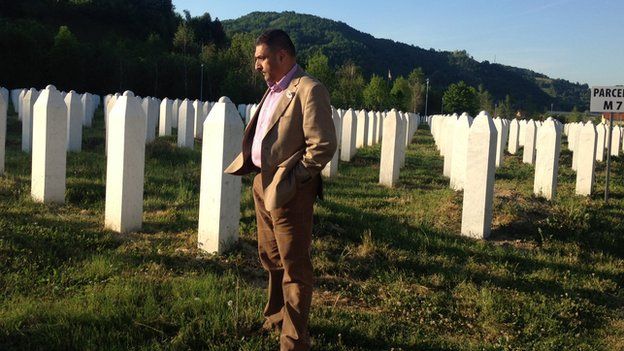Srebrenica massacre: British Muslim soldiers visit graves
- Published

Ahead of the 20th anniversary of the Srebrenica massacre, in which 8,000 Muslim men and boys were rounded up and killed by Bosnian Serb forces, a UK group including British Muslim soldiers have travelled to the region to honour those killed. BBC Asian Network reporter Poonam Taneja went with them. Here is her report:
At the Srebrenica Genocide Memorial in the village of Potacari, Hatidza Mehmedovic remembers the three days in July 1995 when her husband and two young sons were amongst those killed in the surrounding hills and valleys in eastern Bosnia and Herzegovina.
"More than 1,000 children were killed," she tells the visiting British group of forces personnel and community activists.
"Guns were not taken from their hands; pens and pencils were taken from their hands. These children were taken from schools and killed; amongst them was my youngest son.
"They were not criminals, they did not hate anybody, and they were killed only because they were Muslims."
Murdered in warehouses
The multi-faith delegation is visibly moved by Hatidza's story of loss, many wiping away tears as they listen.
Afterwards one member of of the group, Captain Naveed Muhammed, walks through the adjoining cemetery to pay his respects to the more than 6,000 victims buried here.
For him it is an emotional return to the region to which he was once deployed as a British soldier, 19 years ago.
As he passes rows upon rows of white gravestones, he admits it is only now that he is fully aware of the genocide committed here.
In July 1995, two years after the district was designated a United Nations Safe Area, thousands of unarmed boys and men were taken by Serb forces and murdered in farms, factories and warehouses, and buried in mass graves.
"It's quite a humbling, quite a moving experience" says Capt Muhammed.
He says it's hard to describe how overwhelming it is to see the graves of that number of men, boys, children who were not even teenagers at the time.
"Here they are lying before us; they should be in their mid-30s now, in their prime of their lives, yet here they are where they will lie forever."
'Unimaginable suffering'
Those feelings are shared by another member of the group, mother-of-two and campaigner Ilknur Kahraman.
As a schoolgirl in the 1990s she was outraged by the images of the Bosnian war on television and fundraised to send humanitarian aid to her fellow Muslims.
However, she says nothing prepared her for the tragic stories she has heard on this trip, particularly when she learns that many families waited years before their loved ones were found in mass graves and identified.
"I felt like my chest was tightening, I felt like the oxygen in my lungs was being squeezed out, I felt physically sick. I don't think I can even begin to imagine what their suffering has been, their pain," she says.
During the three day visit the group spoke to survivors and were shown where the killings took place.
It was organised by the charity Remembering Srebrenica and the Armed Forces Muslim Forum, which was established in 2014 to build stronger links between the military and the Muslim community.
'Unity and peace'
Imam Asim Hafiz is a religious advisor to the Ministry of Defence and helped set up the group.
"The forum was established very soon after the murder of Drummer Lee Rigby," he explains.
"We wanted to send a delegation which is made up of Muslims in the community, Muslims and non-Muslims serving in the forces to go on a journey together - a journey which talks about acceptance, unity and peace."
The visit has the backing of senior defence officials. But for Captain Naveed Muhammed the journey has been a personal one.
"Being a Muslim, it had an impact on so many fronts, we were talking to the mothers dressed in headscarves, we prayed under the roof of the courtyard and the fact that these men and boys were murdered for being Muslims, that adds many layers of anger and sympathy.
The 20th anniversary of the Srebrenica massacre will be marked with a special ceremony in July. Senior figures are expected to be here for it.
But for the relatives of the thousands of victims, no world figure is likely to ease the pain that many of them still carry.
"I don't know how to hate, yet every day I mourn. I'm sad for all the victims here behind you and every day I ask why this had to happen" says Hatidza Mehmodovic.
Timeline of Srebrenica siege
6-8 July 1995: Bosnian Serb forces start shelling Srebrenica enclave
9 July: Bosnian Serbs step up shelling; thousands of Bosnian Muslim refugees flee to Srebrenica
10 July: Dutch peacekeepers request UN air support after Bosnian Serbs shell Dutch positions. Large crowds of refugees gather around Dutch positions
11 July: More than 20,000 refugees flee to main Dutch base at Potocari. Serbs threaten to kill Dutch hostages and shell refugees after Dutch F-16 fighters bomb Serb positions. Bosnian Serb commander Ratko Mladic enters Srebrenica and delivers ultimatum that Muslims must hand over weapons
12 July: An estimated 23,000 women and children are deported to Muslim territory; men aged 12-77 taken "for interrogation" and held in trucks and warehouses
13 July: First killings of unarmed Muslims take place near village of Kravica. Peacekeepers hand over some 5,000 Muslims sheltering at Dutch base in exchange for the release of 14 Dutch peacekeepers held by Bosnian Serbs
14 July: Reports of massacres start to emerge
- Published18 March 2015
- Published30 January 2015
- Published16 July 2014
- Published11 July 2010